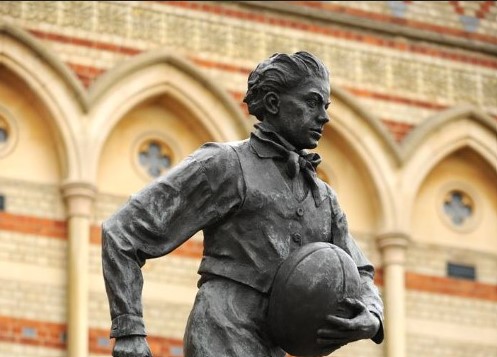The myth of the origin of rugby is intrinsically linked to the figure of William Webb Ellis, a student at Rugby School in England around 1823. According to legend, during a football (soccer) match, Ellis picked up the ball with his hands and ran towards the opposing goal line, thus creating a new sport that would later be known as rugby. This narrative has been celebrated as a symbol of audacity and innovation, and Ellis is frequently considered the pioneer of modern rugby.1
However, doubts have been raised about the veracity of this story, and various criticisms and arguments have been put forward to question it. Among the reasons why it is believed that the story of William Webb Ellis was not the true origin of rugby, there are several theories and pieces of evidence to consider.
Firstly, there is a lack of contemporary documentary evidence to confirm Webb Ellis’s story. The first reference to this anecdote did not emerge until the 1870s, over 40 years after the supposed events took place. This lack of official records or direct eyewitnesses makes the story dubious from a historical standpoint.
Additionally, some historians have suggested that the version of the origin of rugby promoted by Rugby School could have been a later construction to reinforce the identity and prestige of the institution. In other words, the story of Webb Ellis may have been created or exaggerated to elevate the importance of the school and rugby as a sport.
It has also been argued that the transformation from football to rugby was not the work of a single person but rather the result of a gradual evolution in the rules and sporting practices in 19th-century England. Sporting events and playing practices at various schools and clubs would have contributed to shaping what we now know as rugby, rather than just an individual action as the legend attributes to Ellis.
Therefore, although the myth of the origin of rugby associated with William Webb Ellis has been widely disseminated and accepted, there is sufficient argumentation to doubt its veracity. The lack of compelling evidence and the possibility that the story may have been crafted for reasons of prestige and institutional identity call into question its authenticity. The origins of rugby are, ultimately, a complex and disputed topic that continues to generate debate among historians and sports enthusiasts.
William Webb Ellis was born on November 24, 1806, in Salford, near Manchester, England. The son of a British army officer, Ellis spent much of his childhood in various military bases in England and abroad as his family moved frequently due to his father’s military assignments.
It was in 1816 when the Ellis family settled in Rugby, where William began his studies at Rugby School in 1816, a prestigious educational institution founded in 1567. During his time at Rugby, Ellis excelled in sports, especially in football (soccer), the game that would eventually transform into rugby.
After leaving Rugby School, Ellis continued his education at Exeter College, Oxford, where he studied until 1829. Subsequently, he joined the British Army and served as an officer in Ireland and Malta, although little is known about his military career and activities during this period.
William Webb Ellis died on January 24, 1872, in Menton, in the French region of Provence-Alpes-Côte d’Azur, where he lived in retirement after his retirement from the army.
